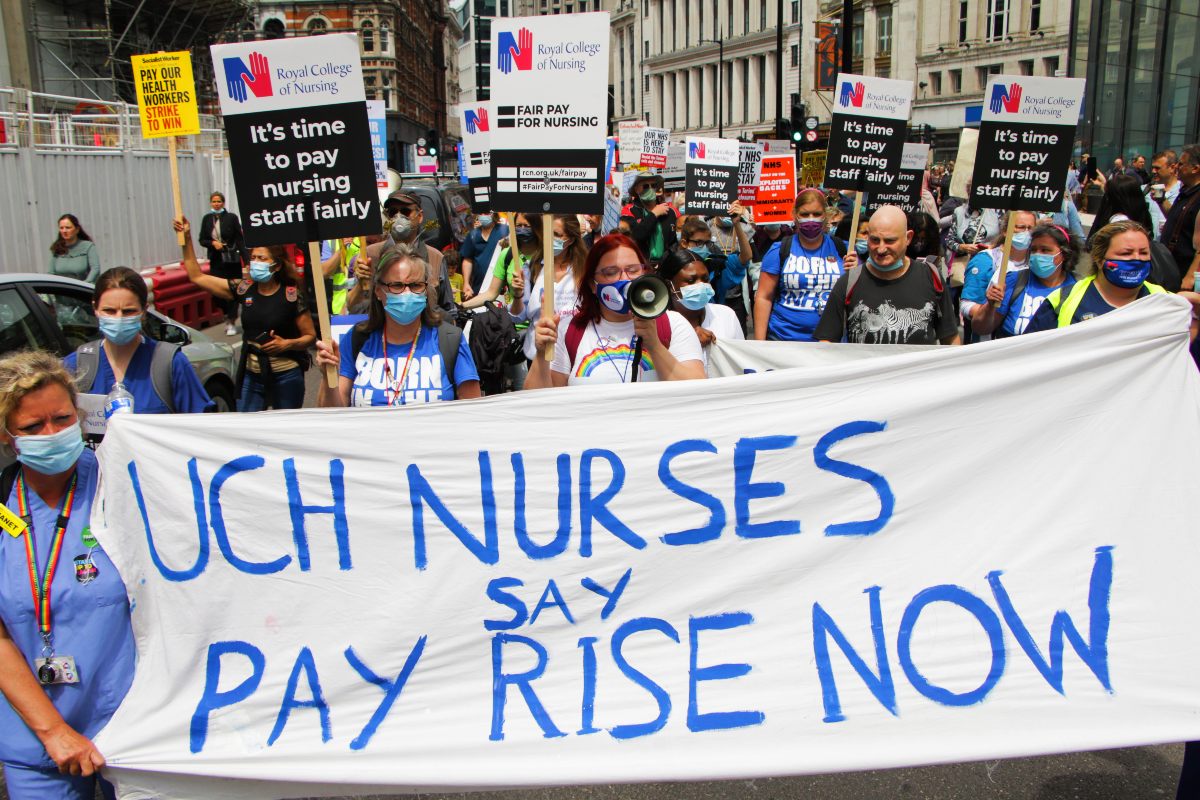Today, the Royal College of Nursing announced that its members have overwhelmingly rejected the Labour government’s pay offer of 5.5 percent.
On a record turnout, two-thirds of RCN members voted to reject this pay award, announced by Chancellor Rachel Reeves back in July, shortly after Labour had come to power.
According to the RCN, the turnout even exceeded the levels seen when nurses were balloted over industrial action in 2022-23.
This vote demonstrates the “fundamental shift in the determination of nursing staff to stand up for themselves, their patients, and the NHS they believe in,” stated RCN general secretary Nicola Ranger.
A record number of you voted in our consultation on the NHS pay award in England – thank you. You are the Voice of Nursing. You voted to REJECT the 5.5% pay award – the UK government must hear that message.
Read more: https://t.co/Q2Xk7egts6 pic.twitter.com/VI9viSMFHk
— The RCN (@theRCN) September 23, 2024
Embarrassingly for the Labour leaders, the RCN’s announcement came just as Reeves was delivering her speech at the party’s annual conference, currently taking place in Liverpool.
The Chancellor claimed that she was “proud to have delivered a meaningful, real pay rise to millions of public sector workers”. But it seems that these same workers do not see this pay rise as “meaningful”, but as derisory.
And rightly so. A 5.5 percent increase is nowhere near enough to provide the full pay restoration that nurses deserve. In real terms, the income of an experienced nurse fell by 25 percent between 2010-24, under successive Tory governments.
This erosion of pay – and conditions – has led to a haemorrhaging of staff across the NHS, including nurses and doctors. Yet Labour has refused to provide any extra funding to solve these problems. Instead, Starmer has asserted that there will be “no more money without reform” (read: counter-reforms and privatisation).
BMA members recently (and reluctantly) voted to accept the government’s separate pay offer to resident doctors, after a long-running dispute and hard-fought struggle. But this RCN result shows that all is not calm amongst NHS workers.

Unfortunately, the RCN leaders have already come out saying that they will not be following up this result with a ballot for strike action. Instead, they have said that they will now wait for the government’s response. But the Labour leaders have already made their position clear.
This Mexican standoff will not be resolved through backroom negotiations, or through moralistic appeals for Starmer and co. to ‘see sense’ and ‘value health workers’. Instead, the trade union leaders need to prepare members for battle.
Instead of sowing illusions in this government, health union leaders must tell the truth: the NHS will never be safe in Labour’s hands.
One thing is clear: Starmer and Reeves have another thing coming if they think that the anger and discontent inside the public sector has been quelled.
This RCN vote could well portend similar rejections by teachers and other public sector workers, paving the way for a new wave of strike action in the coming months.
With Starmer’s government already facing a backlash over its decision to cut the winter fuel allowance from millions of vulnerable pensioners, and with further austerity set to be announced in next month’s Budget, the stage is set for a period of storm, strife, and struggle across Britain.
Resident doctors win pay rise – but no trust in the Labour bosses!
Reema Malhotra, NHS resident doctor (personal capacity)
Last week, the BMA announced the result of the resident doctors’ pay referendum: on a turnout of 70%, two-thirds of members have accepted the government’s offer.
After years of strikes, with vicious attacks in the press, we have accepted a poor offer. The union leadership will claim it as a victory, but that doesn’t hide the fact that they endorsed a deal that falls short of the demand that got them elected: full pay restoration.
Instead, they are promising a ‘bank-and-build’ tactic. This will only confuse the rank and file and undermine momentum, like a stalling car stopping and starting.
This deal won’t resolve the exodus of doctors, as the NHS staggers into another winter crisis. In real terms, we have raised our pay by 4 percent, leaving us roughly 20 percent poorer than we were in 2008.
Many doctors will be relieved to see an end to the dispute. But we should have no trust in our new Labour employers, who have bought themselves a temporary respite, while leaving us underpaid and overworked.
NHS workers deserve better. And we deserve a leadership that understands this!
The NHS needs resources, not technocratic ‘reforms’
Aidan, Manchester
Earlier this month, Starmer responded to a newly-published review of the NHS by Lord Darzi.
Darzi’s report pointed out that the 2010s were the most austere decade since the NHS was funded; that the NHS had been starved of capital funding to build new hospitals and invest in technology; and that the social determinants of health – housing, income, employment, etc. – have all been moving in the wrong direction .
Why, then, did Starmer respond to this report by stressing that there would be “no more money without reform”?
The Labour leaders, disingenuously, suggest that the only option for fixing the NHS is to raise taxes on working people (that is, to implement austerity by another name), or to ‘reform’ the system entirely (read: implement privatisation and counter-reforms).
Darzi’s review was explicit that top-down reorganisation was neither necessary nor desirable. Yet Starmer, brushing aside the issue of funding, emphasised three “big shifts” that his government would implement inside the NHS: better use of technology; shifting care out of hospitals and into communities; and moving from treating sickness to focusing on prevention.
Taken on their own, these measures sound positive. But Starmer is ignoring the massive upfront investment that this approach calls for. Building new facilities, bringing in new technologies, and funding public health efforts all require financial and human resources that the NHS currently does not have.
Without more money, Labour’s plans for the NHS are a mirage.
This will sound depressingly familiar to anyone who works in healthcare. The NHS goes through a major ‘reform’ every decade – most recently in 2022, when Integrated Care Systems replaced the Clinical Commissioning Groups setup in 2012 – with little impact on patient care.
Labour claims that they were “elected first and foremost to sort out the public finances”. But the public wants NHS waiting times reduced, not another austerity package.
Starmer’s plan to fix the NHS without proper funding is destined to fail – prolonging the crisis in healthcare.






